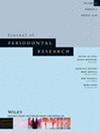Progression from healthy periodontium to gingivitis and periodontitis: Insights from bioinformatics-driven proteomics – A systematic review with meta-analysis
Abstract
Aim
The current study aimed to: (1) systematically review the published literature regarding the proteomics analyses of saliva and gingival crevicular fluid (GCF) in healthy humans and gingivitis and/or periodontitis patients; and (2) to identify the differentially expressed proteins (DEPs) based on the systematic review, and comprehensively conduct meta-analyses and bioinformatics analyses.
Methods
An online search of Web of Science, Scopus, and PubMed was performed without any restriction on the year and language of publication. After the identification of the DEPs reported by the included human primary studies, gene ontology (GO), the Kyoto encyclopedia of genes and genomes pathway (KEGG), protein–protein interaction (PPI), and meta-analyses were conducted. The risk of bias among the included studies was evaluated using the modified Newcastle–Ottawa quality assessment scale.
Results
The review identified significant differences in protein expression between healthy individuals and those with gingivitis and periodontitis. In GCF, 247 proteins were upregulated and 128 downregulated in periodontal diseases. Saliva analysis revealed 79 upregulated and 70 downregulated proteins. There were distinct protein profiles between gingivitis and periodontitis, with 159 and 31 unique upregulated proteins in GCF, respectively. Meta-analyses confirmed significant upregulation of various proteins in periodontitis, including ALB and MMP9, while CSTB and GSTP1 were downregulated. AMY1A and SERPINA1 were upregulated in periodontitis saliva. HBD was upregulated in gingivitis GCF, while DEFA3 was downregulated. PPI analysis revealed complex networks of interactions among DEPs. GO and KEGG pathway analyses provided insights into biological processes and pathways associated with periodontal diseases.
Conclusion
The ongoing MS-based proteomics studies emphasize the need for a highly sensitive and specific diagnostic tool for periodontal diseases. Clinician acceptance of the eventual diagnostic method relies on its ability to provide superior or complementary information to current clinical assessment procedures. Future research should prioritize the multiplex measurement of multiple biomarkers simultaneously to enhance diagnostic accuracy and large study cohorts are necessary to ensure the validity and reliability of research findings.


 求助内容:
求助内容: 应助结果提醒方式:
应助结果提醒方式:


